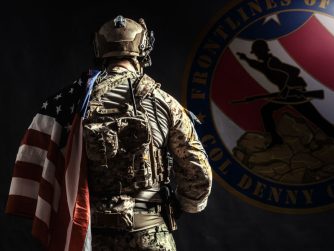The US Supreme Court struck down the Stolen Valor Act today, saying that the First Amendment defends a person’s right to lie — even if that person is lying about awards and medals won through military service.
The path to the Supreme Court began 2007 when Xavier Alvarez was convicted under the Act, which made it illegal for people to claim to have won or to wear military medals or awards they didn’t earn. The jerk had publicly claimed to have won our nation’s highest award, the Medal of Honor, but it turns out he never served in the military. Alvarez got three years probation, a $5,000 fine and community service, but he appealed the decision, claiming the Stolen Valor Act is unconstitutional – amazingly he said that it violates a person’s right to lie.
“The Stolen Valor Act criminalizes pure speech in the form of bare falsity, a mere telling of a lie,” said Alvarez’s attorney, Jonathan Libby. “It doesn’t matter whether the lie was told in a public meeting or in a private conversation with a friend or family member.” The very liberal 9th Circuit Court agreed and called the Stolen Valor Act “facially unconstitutional.”
The government argued that such specific lies are in a special category of speech that is not protected by the First Amendment — when the speech could do harm.
“False claims make the public skeptical of all claims to have received awards, and they inhibit the government’s efforts to ensure that the armed services and the public perceive awards as going only to the most deserving few,” the government said.
In its 6-3 decision, the Supreme Court justices said on Thursday that as written, the act is too broad and ignores whether the liar is trying to materially gain anything through his or her false statement, which would be more akin to fraud.
“The Act by its plain terms applies to a false statement made at any time, in any place, to any person,” stated Justice Kennedy’s written opinion. “… [T]he sweeping, quite unprecedented reach of the statute puts it in conflict with the First Amendment. Here the lie was made in a public meeting, but the statute would apply with equal force to personal, whispered conversations within a home.” “Permitting the government to decree this speech to be a criminal offense, whether shouted from the rooftops or made in a barely audible whisper, would endorse government authority to compile a list of subjects about which false statements are punishable,” he said.
According to several veterans well acquainted with false war stories, claiming you’re a medal-winner can be “more than just lying.” It is, in fact, stealing the valor of true heroes and diluting it—thus stealing from them. A key group in outing phonies, the POW Network, pownetwork.net, shows just how bad the situation is for our true heroes; the government properly acted in passing the Stolen Valor Act.
“It’s not the barroom loudmouth that anyone is interested in,” said Don Shipley, a former SEAL who has been given unique access to the SEAL personnel database so he can root out fakers. “People tend to believe what they’re told, they use that…They do an awful lot of damage.”
Brandon Webb, another former SEAL and founder of the special operations website SOFREP.com, agreed with Shipley that the law was important for going after more than the occasional barstool liar.
All real veterans get outraged when we see folks take advantage of unknowing good people who are trusting in their story, and who gain respect, money, privilege, or maybe just a free drink at our expense. Some of these phonies are vets who decided to elaborate on their resumes; others were liars from the start. All are, in my not very humble opinion, are criminals; liars are not protected by our Constitution. The Court let us down.



